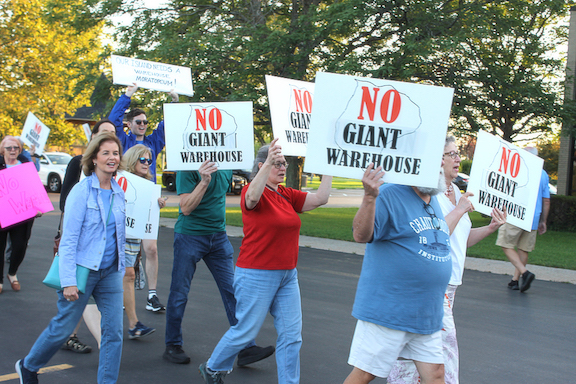Featured News - Current News - Archived News - News Categories
Article and Photos by Karen Carr Keefe
Senior Contributing Writer
About 40 protesters on Monday marched outside Town Hall in favor of a warehouse moratorium and against the Town Board accepting a developer’s supplemental Draft Environmental Impact Statement (DEIS) for a proposed 1.2-million-square-foot Long Road warehouse.
However, the town, at its regular meeting, accepted the DEIS and amended Councilmember Michael Madigan’s proposed moratorium in favor of a more immediate proposal to introduce a local law to revise the town’s M-1 zoning law so it limits the size of buildings to a suggested 300,000 square feet.
Although the protesters didn’t get precisely what they asked for, some walked away from the lengthy meeting with smiles on their faces. That’s because the board passed, by a 4-0 vote, a motion to set a public hearing on a proposed law that, if adopted, could do in several weeks what a moratorium could have taken six months to accomplish: require developers to seek a zoning variance, or special use permit, for any building that would exceed the new size restriction.
Councilmember Christian Bahleda offered the amendment to Madigan’s motion, resulting in the agreement to schedule a public hearing at 8 p.m. Monday, Sept. 18, on the proposed law that, if passed, could require Acquest Development to get a special use permit in order to proceed with its proposed Long Road warehouse.
The Dispatch reached out to the town attorney for clarification on the exact effect of the proposal on Acquest’s already existing plan, but did not receive a reply in time for this edition.
Bahleda’s motion to amend Madigan’s was worded to exclude facilities like Acquest’s project from M-1 zoning:
“I hereby ask you to amend your motion and allow the introduction of a local law to amend the M-1 zoning code to remove warehouse and distribution facilities, but not mini-storage, from the as-of-right use in M-1,” he said. “Allow them as a specially permitted use, but only if they’re limited in size to 300,000 square feet measured either by individual building or total campus.”
Bahleda’s amendment also said the Town Board would refer the local law to the Long Range Planning Committee “to deem or determine that size appropriate.”
Bahleda explained what would be involved in revising the town’s zoning law as it pertains to warehouses: “It’s the specific line in our town code which gives distribution centers and warehouses an ‘as of use’ right. Now they can get that through a special use permit.”
Later in the meeting, the board unanimously accepted Acquest’s DEIS and set a public hearing for 7 p.m. Wednesday, Sept. 20, at the Grand Island High School auditorium for comments on the draft impact statement.
Deputy Supervisor Peter Marston said, “This seems completely awkward that we have to accept this (DEIS) to tell them what we think is wrong with it. But that is the process and we are willing to follow it.”
In the public comment session that began the meeting, a dozen residents spoke of a perceived lack of opportunity, to date, for public input on the size and scope of the Long Road project and its potential impact on town traffic, safety and quality of life.
Cathy Rayhill, of Coalition for Responsible Economic Development for Grand Island (CRED4GI), said, “This Town Board had agreed to public reviews of the DEIS reports with their paid consultants as far back as January 2023, and reiterated their commitment in at least six public meetings through July 17 as evidenced in videos of those meetings. The reviews were never scheduled.
“Then, in a stunning reversal on (Aug. 7), Acting-Supervisor Marston announced during the closing minutes of the Town Board meeting that you had changed course and were going to vote to accept the findings of the report during this Town Board meeting without further review.
“Can you appreciate the violation of trust this represents to residents? We thought we would be getting the benefit of observing the Q&A with the town’s paid consultants and the Town Board to understand omissions and discrepancies in the studies.”
She said Marston posted on the town website, grand-island.ny.us, that it was on legal counsel that it was decided to move forward to the next step of the process.
“Where was your legal counsel the last eight months when you committed to the previous reviews?” Rayhill asked. “Why is there now a rush to accept this report?”
“This is the largest project to ever be considered for Grand Island. The least the Town Board can do is be thorough in its review of the data and make sure it is complete and addresses all major impacts,” she said.

Before Monday night’s Town Board meeting, dozens of Island residents protested outside Town Hall against a mega warehouse and distribution center proposed for Long Road. The Town Board agenda included two warehouse-related items: A supplemental Draft Environmental Impact Statement up for a vote of approval, as well as a moratorium on warehouses and distribution centers.
••••••••
William Huntress of Acquest Development reacted to residents’ expressed concerns about potential negative impacts of a warehouse project – and particularly to Amazon withdrawing its proposed Grand Island warehouse project back in August of 2020.
Huntress said he was happy the town accepted the DEIS, “But, in general, I feel sorry for the Grand Island community – and I say that because they lost the Amazon project. I wasn’t the developer, I just own the land, but I feel much worse for the community than I do for myself.”
He noted he has had the property for 30 years.
“I think the time frames to get approvals for a project that’s already zoned properly is ridiculous,” Huntress said. “It’s literally been almost three years since we submitted a site plan, and there’s no business in the country that’s going to wait around three years for someone to approve a site plan.”
“I think that’s the biggest economic loss to Erie County, and it could have been in Grand Island’s backyard, and it probably would have made $25 million (annually) in tax revenue over 15 years. I don’t know how that could be replaced,” he said.
Huntress explained, “I realize that there’s issues with noise and light and you’re taking up green space, but I feel sorry for the community. I don’t think that people understand the benefits that they lost. It’s right next to the expressway, so it wouldn’t have bothered many people, and you’re going toward electric trucks now, too.
“I think people are very shortsighted in the Grand Island community. I don’t know what they’re going to do when taxes continue to rise and their kids don’t have jobs.”
He added, “I appreciate that the Town Board members, at least they’re trying to come up with a solution. I appreciate the input from the neighbors, but I think that it was a great injustice to lose the Amazon project.”
“I see it as growth and opportunity, other people see it as a negative,” he said. “I think the most important thing in development is this: It has nothing to do with the zoning, it’s the quality of what you build.”
Of the proposed zoning law changes, Huntress said, “They’re always changing the game. They want to change the game again. Who’s the real loser – it’s not me, it’s the community – that’s the loser. The process that they put developers through on Grand Island is just going to kill it even more. They had the golden goose and blew it. I wasn’t even the developer. So, I lost a land sale. But that was nothing in comparison to what the town lost.”
Speaking of the Amazon distribution center project that’s coming to the Town of Niagara, Huntress said, “That traffic is now going to go over the (Grand Island) bridge from Niagara Falls – and that’s a $550 million project, and they (Grand Islanders) are going to get the traffic,” without the millions in tax revenue.
Before the public comment period that topped the night’s agenda, Town Attorney Charles Malcomb of Hodgson Russ, was invited by the board to explain what’s involved in the SEQR (State Environmental Quality Review) process for the Long Road warehouse project, and what it means to have the DEIS accepted as adequate for public review.
He said accepting the draft statement kicks off the review process.
“It does not mean that the board is making any decisions on the project,” Malcomb said. “It doesn’t mean there’s any approvals being issued, or that the board is locking itself into any course of action for the project. What it does mean it that the board is determining that the Draft Environmental Impact Statement is adequate for you, the public, to review it, to provide the board with comments on it, and the board, as part of the resolution, is going to set a public hearing to provide your feedback on the review.”
Malcomb explained there would also be an opportunity for the public to submit written comments.
He said the next step results in a new draft and includes any needed revisions. The applicant and the Town Board are obligated to respond to all the comments received, and additional studies may be required. A final Environmental Impact Statement is the record upon which any decisions will be made, he said.
Malcomb said the Town Board ultimately issues a finding statement under SEQR, makes a determination that any adverse environmental impacts are mitigated to the maximum extent practicable, and would then make any decision on the land use application.
Once the town had set a public hearing on proposed zoning law changes and accepted the DEIS to kick off the warehouse project review, some positive comments were made at the final public comment period at the close of the meeting.
Michael Rayhill told the Town Board, “I really appreciate you countenancing the warehouse moratorium and understanding the sort of vast implications that this project has, and also considering the amendments to the M-1 designation for our zoning laws.”

Joanna Frost and sons, Lincoln and Liam, both 5, hold signs protesting the proposed development of a giant warehouse on Grand Island. “I just don’t feel like Grand Island is the appropriate place for it. It’s way too big for our small island,” she said.





























